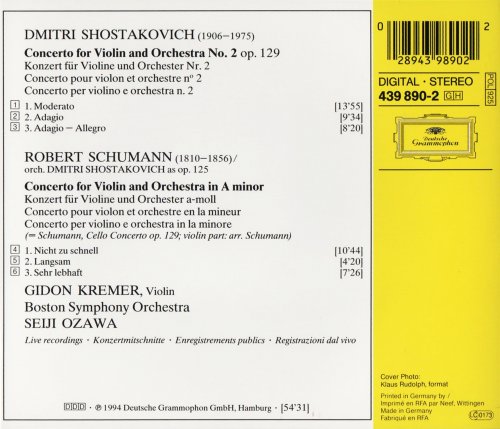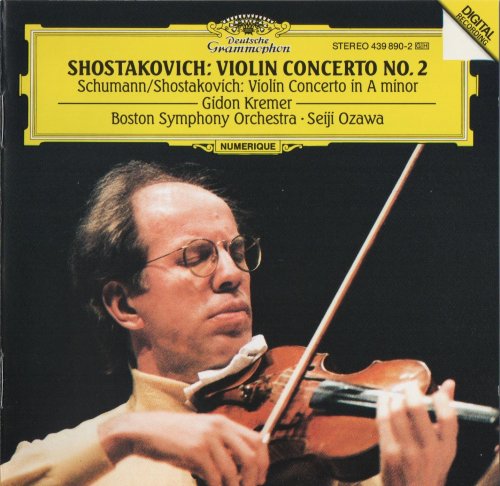
Gidon Kremer, Boston Symphony Orchestra, Seiji Ozawa - Shostakovich, Schumann: Violin Concertos (1994)
BAND/ARTIST: Gidon Kremer, Boston Symphony Orchestra, Seiji Ozawa
- Title: Shostakovich, Schumann: Violin Concertos
- Year Of Release: 1994
- Label: Deutsche Grammophon
- Genre: Classical
- Quality: FLAC (image+.cue,log,scans)
- Total Time: 54:34
- Total Size: 271 Mb
- WebSite: Album Preview
Tracklist:
Concerto For Violin And Orchestra No. 2 Op. 129
1. 1. Moderato 13:55
2. 2. Adagio 9:34
3. 3. Adagio - Allegro 8:20
Concerto For Violin And Orchestra In A Minor
4. 1. Nicht Zu Schnell 10:44
5. 2. Lebhaft 4:20
6. 3. Sehr Lebhaft 7:26
Performers:
Gidon Kremer - violin
Boston Symphony Orchestra
Seiji Ozawa - conductor

Concerto For Violin And Orchestra No. 2 Op. 129
1. 1. Moderato 13:55
2. 2. Adagio 9:34
3. 3. Adagio - Allegro 8:20
Concerto For Violin And Orchestra In A Minor
4. 1. Nicht Zu Schnell 10:44
5. 2. Lebhaft 4:20
6. 3. Sehr Lebhaft 7:26
Performers:
Gidon Kremer - violin
Boston Symphony Orchestra
Seiji Ozawa - conductor
Like much of Shostakovich's music following his heart attack in 1966, the Second Concerto is a work of shadows and dark introspection. The musical substance bears hallmarks of his later style: obsessive, cryptic motifs, repeated rhythmic cells, and concentration on particular intervals, notably the semitones and perfect fourths proclaimed at the outset. Also, as in the two cello concerti, the solo horn emerges in this work as an important protagonist in the drama.
Beginning in the restrained manner of the opening nocturne of the First Concerto, the exposition of the lachrymose first subject rapidly builds to an anguished climax through agitated and grittily dissonant writing for the soloist. The tension eases slightly for the second subject group, contrasting spiky, rather mocking five note figures with lyrical imitative passages for solo violin and woodwind. The unnerving momentum generated by the development, savagely distorting the thematic material, is arrested abruptly by four chords which herald the recapitulation. Following an unaccompanied cadenza for the soloist, reprising the first subject, the recapitulation dissolves into skeletal textures and thematic fragments, all emotionally drained.
The second movement intensifies rather than relieves the sadness of expression. Through exploratory variations, rising and falling in tension, the soloist seems to search for release from the suffocating atmosphere; and what a suffocating atmosphere it is! This is bleak and tortured music. Met with denial, the violin unleashes a snarling, recitative-like cadenza which lends a troubled spirit to the descending section of the arch like structure of the movement. These pages, and the elegiac repose of the closing horn solo, recall the fourth movement of the thirteenth symphony, and Yevtushenko's bitterly ironic verse, "Fears are dying out in Russia...".
This repose is short-lived, rudely dismissed by the declamatory opening to the finale. Imitative, sardonic exchanges between soloist and horns lead to a frenetic Allegro. The chromatic rondo theme is busily energetic, but the humor is grotesque and the underlying mood is bitter and pained. The horns' relationship with the soloist becomes increasingly ambiguous: the supportive soul mate of the first two movements here emerges as a critic, even antagonist. The fulcrum of this movement is an extensive cadenza, which arrests the orchestra's headlong rush by recalling the material of the introduction in a manner which parallels the finale of the fourth string quartet. In soliloquy, the violin mocks itself in a series of distorted and fragmented recollections of earlier material. Through the remainder of the movement, the orchestra appears to battle with itself to establish an affirmative, major key resolution, but is undermined by the sardonic willfulness of the soloist and sniping interceptions by the horns. Eventually the forces of resolution have their way and the piece ends in the title's relative major, but theirs is an uncomfortable triumph.
I thoroughly enjoy this and it has, as occasion would see it, become one of my most played cd's. There is wisdom in this work but it takes more patient and sophisticated listening to appreciate it. Also, as I said before, Kremer's interpretation and performance is impeccable. I am confused when this reviewer says that Ozawa is detached from the performance. The parts are all in time and match the style of this piece. I doubt if we can seriously get into the conductor's head and determine accurately if he was emotionally attached at the time. outside of its impact on the performance, such issues are irrelevant. This is certainly the case here. I say bravo to Performer and Composer.
I don't have much to say about the Schumann arrangement other than that I enjoy it. I am not a cellist so I'm not familiar with that repertoire. It is, however, very enjoyable, even arranged for violin. I will say that the orchestration seems to be improved from the original in this arrangement in my ears. There is much more colour and the lyrical sound of the violin gives a different timbre and taste to the whole work. So all in all, Highly Recommended.
Beginning in the restrained manner of the opening nocturne of the First Concerto, the exposition of the lachrymose first subject rapidly builds to an anguished climax through agitated and grittily dissonant writing for the soloist. The tension eases slightly for the second subject group, contrasting spiky, rather mocking five note figures with lyrical imitative passages for solo violin and woodwind. The unnerving momentum generated by the development, savagely distorting the thematic material, is arrested abruptly by four chords which herald the recapitulation. Following an unaccompanied cadenza for the soloist, reprising the first subject, the recapitulation dissolves into skeletal textures and thematic fragments, all emotionally drained.
The second movement intensifies rather than relieves the sadness of expression. Through exploratory variations, rising and falling in tension, the soloist seems to search for release from the suffocating atmosphere; and what a suffocating atmosphere it is! This is bleak and tortured music. Met with denial, the violin unleashes a snarling, recitative-like cadenza which lends a troubled spirit to the descending section of the arch like structure of the movement. These pages, and the elegiac repose of the closing horn solo, recall the fourth movement of the thirteenth symphony, and Yevtushenko's bitterly ironic verse, "Fears are dying out in Russia...".
This repose is short-lived, rudely dismissed by the declamatory opening to the finale. Imitative, sardonic exchanges between soloist and horns lead to a frenetic Allegro. The chromatic rondo theme is busily energetic, but the humor is grotesque and the underlying mood is bitter and pained. The horns' relationship with the soloist becomes increasingly ambiguous: the supportive soul mate of the first two movements here emerges as a critic, even antagonist. The fulcrum of this movement is an extensive cadenza, which arrests the orchestra's headlong rush by recalling the material of the introduction in a manner which parallels the finale of the fourth string quartet. In soliloquy, the violin mocks itself in a series of distorted and fragmented recollections of earlier material. Through the remainder of the movement, the orchestra appears to battle with itself to establish an affirmative, major key resolution, but is undermined by the sardonic willfulness of the soloist and sniping interceptions by the horns. Eventually the forces of resolution have their way and the piece ends in the title's relative major, but theirs is an uncomfortable triumph.
I thoroughly enjoy this and it has, as occasion would see it, become one of my most played cd's. There is wisdom in this work but it takes more patient and sophisticated listening to appreciate it. Also, as I said before, Kremer's interpretation and performance is impeccable. I am confused when this reviewer says that Ozawa is detached from the performance. The parts are all in time and match the style of this piece. I doubt if we can seriously get into the conductor's head and determine accurately if he was emotionally attached at the time. outside of its impact on the performance, such issues are irrelevant. This is certainly the case here. I say bravo to Performer and Composer.
I don't have much to say about the Schumann arrangement other than that I enjoy it. I am not a cellist so I'm not familiar with that repertoire. It is, however, very enjoyable, even arranged for violin. I will say that the orchestration seems to be improved from the original in this arrangement in my ears. There is much more colour and the lyrical sound of the violin gives a different timbre and taste to the whole work. So all in all, Highly Recommended.

Classical | FLAC / APE | CD-Rip
As a ISRA.CLOUD's PREMIUM member you will have the following benefits:
- Unlimited high speed downloads
- Download directly without waiting time
- Unlimited parallel downloads
- Support for download accelerators
- No advertising
- Resume broken downloads


